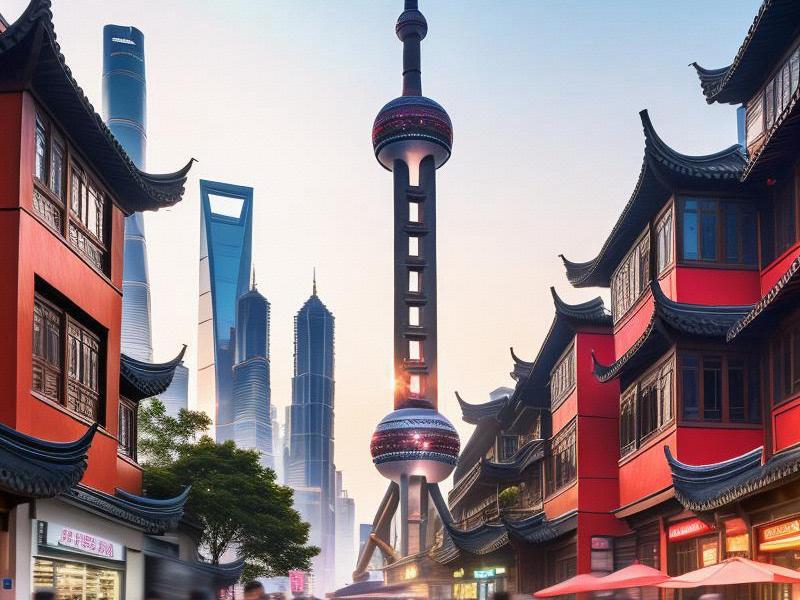This article delves into the vibrant cultural scene of Shanghai, exploring how the city is balancing its rich historical heritage with rapid modernization. It examines the efforts to preserve traditional arts, the rise of contemporary cultural initiatives, and the impact of urban development on Shanghai's cultural identity.

Shanghai, a city that has long been a beacon of China's economic and cultural evolution, stands today as a testament to the harmonious coexistence of tradition and modernity. As one of the world's most dynamic metropolises, Shanghai is not only a hub for commerce and finance but also a vibrant center for culture, art, and innovation. The city's cultural renaissance is a fascinating journey through time, where the echoes of the past blend seamlessly with the vibrancy of the present.
The historical roots of Shanghai's culture are deeply entrenched in its water towns and ancient streets. The Bund, with its colonial-era architecture, and the Yu Garden, a classical Chinese garden, are just two examples of the city's rich historical tapestry. These landmarks serve as a reminder of Shanghai's past, a time when the city was known as the "Paris of the East" due to its cosmopolitan culture and blend of Eastern and Western influences.
Preservation of these historical treasures is a priority for the city. Efforts such as the restoration of the former French Concession and the conservation of the Nanjing Road pedestrian street reflect Shanghai's commitment to maintaining its architectural heritage. These projects not only safeguard the city's history but also provide a unique backdorpfor cultural activities and tourism.
However, Shanghai's cultural scene is not just about preserving the past; it is also about embracing the future. The city has become a breeding ground for contemporary art, music, and theater. Institutions like the Power Station of Art, a former power plant turned contemporary art museum, and the Shanghai Museum, which houses an impressive collection of Chinese art, showcase the city's dedication to fostering a thriving cultural ecosystem.
上海龙凤419官网 The rise of cultural festivals and events further highlights Shanghai's vibrant cultural scene. The Shanghai International Film Festival, one of the oldest and most prestigious film festivals in Asia, attracts filmmakers and audiences from around the world. Similarly, the Shanghai International Arts Festival features a diverse range of performances, from classical music to contemporary dance, celebrating the city's role as a global cultural hub.
Urban development in Shanghai has also played a significant role in shaping its cultural identity. The city's skyline, dominated by the iconic Oriental Pearl Tower and the futuristic Shanghai Tower, symbolizes the rapid modernization of the metropolis. Yet, amidst this urban sprawl, there is a conscious effort to integrate green spaces and cultural amenities into the urban fabric.
The Shanghai World Expo Park, a legacy of the 2010 World Expo, is a prime example of this integration. The park not only hosts international exhibitions but also serves as a recreational space for residents and visitors alike. The China Art Museum, located within the park, is a striking architectural marvel that houses a vast collection of Chinese art, further emphasizing the city's commitment to cultural preservation and innovation.
The cultural renaissance of Shanghai is not without its challenges. The rapid pace of urbanization has led to concerns about the loss of historical neighborhoods and the displacement of local communities. Balancing economic development with cultural preservation remains a delicate task for city planners and policymakers.
上海贵族宝贝sh1314
Despite these challenges, Shanghai continues to thrive as a cultural powerhouse. The city's ability to blend tradition with modernity is a source of inspiration for other urban centers around the world. It demonstrates that a city can grow and evolve without losing its soul.
The role of the local community in Shanghai's cultural renaissance cannot be overstated. Artists, musicians, and cultural entrepreneurs are at the forefront of this movement, using their creativity to shape the city's cultural landscape. Grassroots initiatives, such as community art projects and neighborhood festivals, play a crucial role in fostering a sense of belonging and pride among residents.
Education also plays a vital role in preserving and promoting Shanghai's cultural heritage. Schools and universities offer programs that teach traditional arts and crafts, ensuring that these skills are passed down to future generations. Cultural exchanges and collaborations with international institutions further enrich the city's cultural scene, bringing in fresh perspectives and ideas.
上海贵人论坛 Technology is another key player in Shanghai's cultural renaissance. The city has embraced digital innovation, using it to preserve and share its cultural heritage. Virtual reality tours of historical sites, online exhibitions, and digital archives are just a few examples of how technology is being used to make culture more accessible to a wider audience.
The impact of Shanghai's cultural renaissance extends beyond the city itself. As a global city, Shanghai serves as a bridge between China and the rest of the world, sharing its unique cultural experiences and learning from others. This cultural exchange fosters mutual understanding and respect, contributing to a more interconnected and harmonious global community.
In conclusion, Shanghai's cultural renaissance is a story of resilience, innovation, and unity. The city's ability to preserve its historical heritage while embracing modernity is a testament to the strength and adaptability of its people. As Shanghai continues to grow and evolve, its cultural scene will undoubtedly remain a vibrant and dynamic force, inspiring future generations to cherish and celebrate their rich cultural heritage.
The journey through Shanghai's cultural renaissance is a reminder that the past and the future are not mutually exclusive but can coexist in harmony. It is a story of how a city can honor its history while looking boldly to the future, creating a cultural identity that is uniquely its own. Shanghai's cultural renaissance is not just a local phenomenon but a global inspiration, showcasing the power of culture to transform and unite people in an ever-changing world.